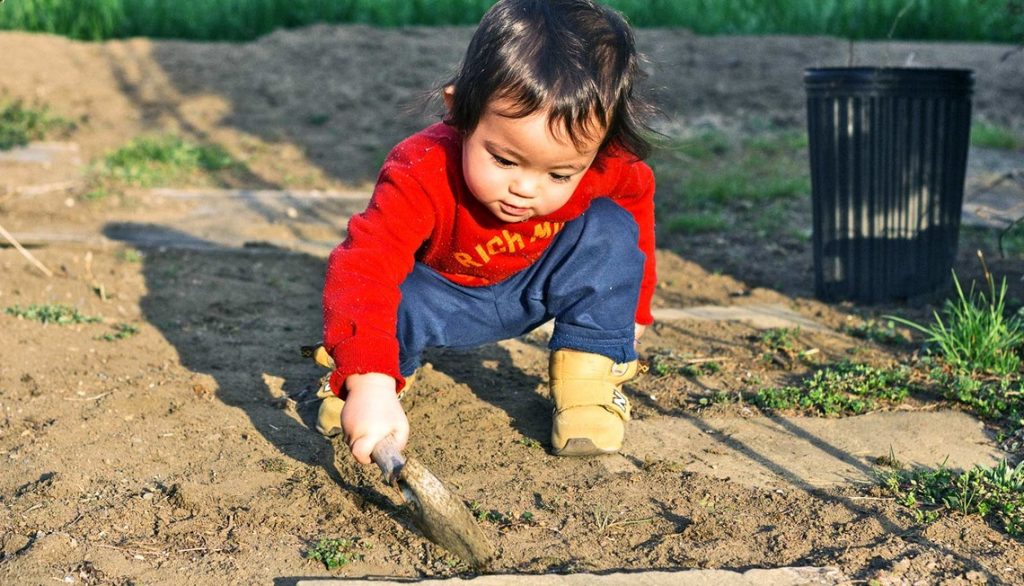No, it’s not what you may be thinking…I don’t mean dirty as in not playing fair. I simply mean dirt itself. How comfortable are you, with the idea of letting your child play and get their hands dirty?
I admit I’m cringy about it. I don’t like the idea of my boys getting dirt all over them and their clothes, so I hardly encourage them to play dirty.
But studies have shown that there are benefits to letting kids play in the dirt. While it’s not literally playing with dirt itself, it is geared more towards a lifestyle of natural living where children spend their time playing outdoors and being with nature.
Four Good Reasons Why We Should Let Children Play Outside in The Dirt
- Believe it or not, it’s a boost to their immune system! Even if they accidentally eat dirt! When children are kept clean and not exposed to everyday germs which are commonly found in dirt and mud, they miss out on building a robust immune system to fight illnesses.
- Soak up the sun and give them a healthy dose of vitamin D which is necessary for bone health and building up immunity too.
- Free and unstructured play outdoors is a great way to relieve anxieties and destress. This isn’t only true for children but for us, adults too. Spending more time outdoors helps those with poor mental health as well.
- Playing in the dirt as carefree as can be is actually a lot of fun for children. When they are free to run, hop, climb, crawl and do some cartwheels and jump around, it’s all good for their physical development.
How Can Dirt Boost The Immune System?
Epidemiologists have observed a sharp uptick in the rates of a variety of chronic inflammatory disorders, such as allergies and autoimmune disorders in Western Europe, North America and Australia. (Source: Forbes)
In more recent times, these observations have narrowed the causal factors to pinpoint to microbiota.
The microbiota plays a fundamental role on the induction, training and function of the host immune system. In return, the immune system has largely evolved as a means to maintain the symbiotic relationship of the host with these highly diverse and evolving microbes. When operating optimally this immune system–microbiota alliance allows the induction of protective responses to pathogens and the maintenance of regulatory pathways involved in the maintenance of tolerance to innocuous antigens.
Source: National Center for Biotechnology Information
What this says is that in our modern lifestyle, we tend to focus on excessive hygiene. For children, this results in a lack of natural exposure to microbes. This lack of microbes in turn results in an alteration in how the immune system is trained during the children’s formative years. It can result in an increase in the risk for inflammatory disorders.
Dirt Can Also Benefit Kids In Their Overall Health
A two-decade study by Northwester University says that dirt can be good for children’s cardiovascular health too. It states that children who are exposed to germs and pathogens during infancy show a lower risk of cardiovascular inflammation (a precursor to heart attack and stroke) in adulthood.
Researchers from University of California School of Medicine also found that common bacterial species that lives on the human skin can help prevent inflammation and improve the skin’s ability to heal.
This will bode well for children as they often get scrapes and cuts in the course of playing. Being a little dirty and building up these benefits would help them heal faster instead of developing allergies against them.
Braving The Dirt And Being OK With It
I guess having a home that’s too clean and keeping our children super hygienic and away from dirt may seem counter-productive seeing the findings above. I’m one of those mothers who would make the kids go wash their hands and feet as soon as they come into the house after having stepped outside for just a little while. Maybe it doesn’t have to be that way…
We have pets and sometimes we see them picking at soil and eating it. At first we stopped them but then found that they still do it every now and then. I guess nature knows best about what’s good for them. Their animal instincts tell them they need whatever nutrients they’re lacking that can be found in soil, and not what we are clean-feeding them.
I’m not saying we go to the extent of frolicking with our pets in dirt, but being OK with our children getting dirty can be their naturally healthy way of life. And so I’ll make my adjustments and learn to embrace letting them play dirty more often. What about you? Do your children spend more time outdoors and come home dirty but happy?
